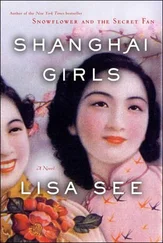Lisa See - Peony in Love
Здесь есть возможность читать онлайн «Lisa See - Peony in Love» весь текст электронной книги совершенно бесплатно (целиком полную версию без сокращений). В некоторых случаях можно слушать аудио, скачать через торрент в формате fb2 и присутствует краткое содержание. Жанр: Старинная литература, на английском языке. Описание произведения, (предисловие) а так же отзывы посетителей доступны на портале библиотеки ЛибКат.
- Название:Peony in Love
- Автор:
- Жанр:
- Год:неизвестен
- ISBN:нет данных
- Рейтинг книги:4 / 5. Голосов: 1
-
Избранное:Добавить в избранное
- Отзывы:
-
Ваша оценка:
- 80
- 1
- 2
- 3
- 4
- 5
Peony in Love: краткое содержание, описание и аннотация
Предлагаем к чтению аннотацию, описание, краткое содержание или предисловие (зависит от того, что написал сам автор книги «Peony in Love»). Если вы не нашли необходимую информацию о книге — напишите в комментариях, мы постараемся отыскать её.
Peony in Love — читать онлайн бесплатно полную книгу (весь текст) целиком
Ниже представлен текст книги, разбитый по страницам. Система сохранения места последней прочитанной страницы, позволяет с удобством читать онлайн бесплатно книгу «Peony in Love», без необходимости каждый раз заново искать на чём Вы остановились. Поставьте закладку, и сможете в любой момент перейти на страницу, на которой закончили чтение.
Интервал:
Закладка:
I was not that. I felt nothing but despair. Books and poems can’t keep away hunger, but without them I didn’t have a life.
“Please tell me you are angry,” Mama pleaded. “The doctor said you’d get angry.”
When I didn’t answer, she spun away from me and sank to her knees.
Below, I watched as Shao dropped the editions of The Peony Pavilion I’d collected into the flames. As each one was eaten by the fire, I shriveled inside. Those were my most treasured possessions. Now they’d been reduced to tiny feathers of ash that drifted up on the wind and out and away from our compound. My project and all my hopes for it disappeared. I was ( 8 5 )
numb with despair. How could I go to my husband’s home now? How would I survive my loneliness?
Next to me, Mama cried. Her body bent forward until her forehead was on the ground, and then she shuffled to me, as submissive as a servant. She gathered the hem of my skirt into her fingers and buried her face in the silk.
“Please be angry with me.” Her voice was so soft I could barely hear her. “Please, daughter, please.”
I let my hand rest lightly on the back of her neck, but I didn’t say a word. I just stared at the fire.
A few minutes later, Shao came and took Mama away.
I stayed by the window, my arms resting on the sill. The garden was bleak in winter. Storms and frost had stripped the trees bare. The shadows lengthened and the light dimmed. I didn’t have the strength to move.
Everything I’d been working on had been destroyed. At last, I pulled myself up. My head spun. My legs trembled. I thought my lily feet wouldn’t be able to bear my weight. Slowly I made my way across the room to the bed. The silk quilt was twisted and rumpled from my futile attempts to save my books. I pulled back the quilt and climbed back in the bed. As my legs slipped down under the cool silk I felt them bump into something. I reached under the fabric and pulled out Volume One of the copy of The Peony Pavilion that my future sister-in-law had sent me. In the madness of the purge, this one book with all the writing in the margins had been saved. I sobbed in gratitude and grief.
s om et i m e s late at night after that horrible day I’d leave my bed, step over Shao’s sleeping form, and go to the window, where I’d pull aside the heavy curtains that kept out the winter cold. The snows had come and the thought of once-fragrant blossoms being crushed by the bitter whiteness troubled me. I stared at the moon and watched its slow trek across the sky.
Night after night, dew dampened my gown, weighted my hair, chilled my fingers.
I could no longer bear the endlessness of the frigid days. I thought of Xiaoqing and how she had dressed every day, smoothing her skirts about her. She had sat up in bed so as not to muss her hair, she had tried to remain beautiful, but the bleak gloom I felt about my future life paralyzed me and I did none of these things. I even stopped caring for my feet. Shao washed and wrapped them with great tenderness. I was grateful but wary ( 8 6 )
too. I kept my saved volume of The Peony Pavilion hidden in the silks around me, afraid that she would find it and tell Mama, and it would be taken away to be burned.
Doctor Zhao came again. He examined me, frowned, but then said,
“You took the correct action, Lady Chen. You exorcised the curse of literacy from your daughter. Burning those inauspicious books has helped ward off the evil spirits that surround her.”
He listened to my pulses, watched me breathe in and out, asked me a few meaningless questions, and then announced, “Maidens, particularly at the moment of marriage, are susceptible to the evil attention of malevolent spirits. Young girls often lose their minds to these apparitions. The more beautiful the girl, the more she will suffer from chills and fever.
She’ll stop eating, much as your daughter has stopped eating, until she dies.” He squeezed his chin thoughtfully before going on. “This, as you might expect, is not something a future husband wants to hear. And I can say from experience that many girls in our city have used this claim to keep from having conjugal relations upon marrying into their husbands’
homes. But, Lady Chen, you should be grateful. Your daughter is clear of such debauchery. She claims no improper relations with any gods or spirits. She is still pure and ready for marriage.”
These words did not cheer my mother, and I felt even worse. I saw no way out of my wedding night or the unhappy years that would come af-terward.
“Tea brewed from fresh snow will cause her cheeks to bloom in time for the ceremony,” Doctor Zhao said as he left.
Every day Mama came to stand by my bed, her face wan with dread.
She begged me to get up, visit my aunts and cousins, or eat a little. I tried to laugh lightly at her concern.
“I’m fine here, Mama. Don’t worry. Don’t worry.”
But my words gave her no comfort. She brought back the diviner. This time he slashed the air around my bed with a sword, trying to scare away the evil spirits he claimed lurked there. He hung an amulet of stone around my neck to prevent my soul from being stolen by a hungry ghost.
He asked my mother for one of my skirts into which he tied bundles of peanuts, telling her that each peanut would serve as a prison for predatory spirits. He shouted out incantations. I pulled the bedclothes up over my face so he wouldn’t see my tears.
.
.
.
( 8 7 )
f or dau g h te r s, marry i ng out is a little like dying. We say goodbye to our parents, our aunts and uncles, our cousins, and the servants who cared for us, and go into an entirely new life, where we live with our true families, where our names will be listed in our in-laws’ ancestral hall. In this way, marriage is like experiencing death and rebirth without having to travel to the afterworld. These are morbid thoughts for any bride, I know, but mine were compounded by my unhappy situation. That morbidity sent my mind into darker and darker places. Sometimes I even believed—
hoped—I might be dying like Xiaoqing or the other lovesick maidens. I let my mind dwell in theirs. I used my tears to mix the ink, and then I took up my brush. Lines of poetry flowed from the tip: I have learned to use the pattern of butterflies and flowers in my embroidery.
I have been doing this for years, because I’m expecting my wedding day.
Do people know that once I go to the afterworld The flowers will not be fragrant, nor the butterflies fly for me?
For days my mind burned with words and emotions. I wrote and wrote. When I felt too tired and weary to lift my brush I had Shao write down my poems for me. She did as she was told. Over the next few days, I dictated another eight. My words floated out one by one, like peach flowers floating on a grotto stream.
We reached the twelfth month. Charcoal burned all day and night in the brazier, but I was never warm. I was to be married in ten days.
My silk slippers are only seven centimeters long.
My waistband is loose even though I fold it in half.
Since my fragile being does not allow me to walk to the afterworld, I have to lean on the wind to go there.
I worried that someone would find them and laugh at my melodrama or say my words had as much importance and permanence as the songs of insects. I folded the pieces of paper and looked around the room for a place to hide them, but all my furniture would eventually be taken to my husband’s home.
I was adamant that my poems not be found, but I didn’t have the strength of will to set fire to them. Too many women burn their words in a fit of thinking them not worthy, only to regret it later. I wanted to keep ( 8 8 )
these, imagining that one day, after I was a married lady with children of my own, I might forget my poet. I would come to visit my family, find my poems, read them again, and remember my lovesick girlhood. Wouldn’t that be for the best?
Читать дальшеИнтервал:
Закладка:
Похожие книги на «Peony in Love»
Представляем Вашему вниманию похожие книги на «Peony in Love» списком для выбора. Мы отобрали схожую по названию и смыслу литературу в надежде предоставить читателям больше вариантов отыскать новые, интересные, ещё непрочитанные произведения.
Обсуждение, отзывы о книге «Peony in Love» и просто собственные мнения читателей. Оставьте ваши комментарии, напишите, что Вы думаете о произведении, его смысле или главных героях. Укажите что конкретно понравилось, а что нет, и почему Вы так считаете.












